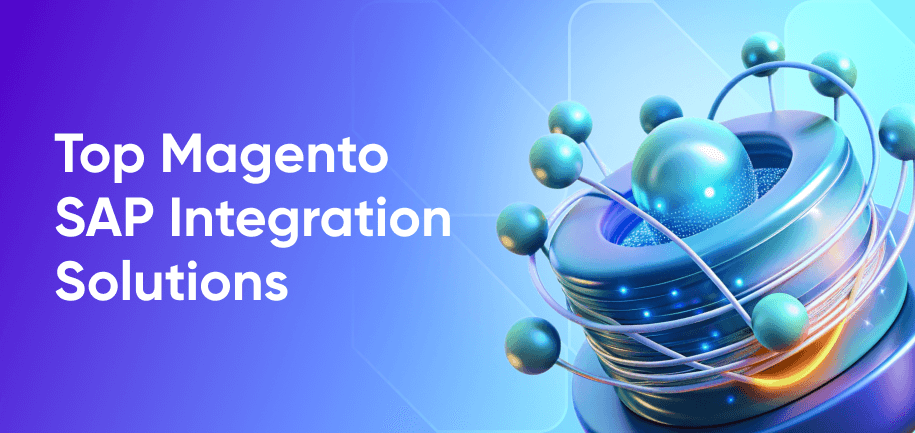Magento SAP integration helps e-commerce businesses streamline operations and improve customer experience, offering real-time data exchange and faster processing. These aspects help e-commerce businesses meet customers’ expectations and maintain profitability.
In today’s guide, we’ll explore the most popular Magento SAP integration solutions available today. We'll cover approaches tailored to Magento SAP Business One integration, Magento 2 SAP integration, as well as broader Magento SAP strategies. Each solution stated here is evaluated for scalability, reliability, and compatibility with modern e-commerce workflows.
Why Magento SAP Integration Matters
Magento SAP integration is about connecting two systems: Magento, the robust e-commerce platform, and SAP, the enterprise resource planning (ERP) suite. When they work together, the benefits are game-changing:
Automated Order Processing: Orders placed in Magento automatically sync to SAP.
Inventory Synchronization: Real-time updates prevent overselling or stockouts.
Customer Data Flow: Profiles, preferences, and histories stay aligned.
Streamlined Accounting: Sales, taxes, and revenue reports flow into SAP seamlessly.
Whether you're a mid-sized retailer or a global brand, Magento SAP integration gives you the data visibility and process automation you need to compete.
Top Solutions for Magento SAP Integration
1. APPSeCONNECT
APPSeCONNECT is a widely used tool that offers robust Magento SAP integration, particularly for Magento SAP Business One integration and Magento 2 SAP integration. It provides pre-built connectors that cover a broad range of workflows:
- Sync orders, invoices, customers, and inventory
- Bi-directional data flow
- Cloud and on-premise compatibility
APPSeCONNECT is ideal for businesses that want fast deployment without compromising on customization. It supports Magento SAP workflows that require deep ERP control.
2. Celigo Integrator.io
Celigo's cloud-native integration platform is known for its versatility and ease of use. It supports advanced Magento SAP integration scenarios, including:
Multi-channel e-commerce integrations
Automated financial workflows
Custom scripts and logic for complex SAP processes
For Magento 2 SAP integration, Celigo offers intuitive templates and real-time synchronization. It’s a solid option for businesses scaling rapidly.
3. eBridge Connections
eBridge offers a mature platform built to handle complex Magento SAP integration needs. It shines in cases where regulatory compliance, high volume, or specialized workflows are required.
Deep support for Magento SAP Business One integration
Managed cloud-based service
Strong SLA-backed reliability
eBridge is often chosen by enterprises that need robust B2B features and guaranteed uptime.
4. MuleSoft Anypoint Platform
MuleSoft is an enterprise-grade iPaaS (Integration Platform as a Service) that offers extensive capabilities for Magento SAP integration. Its advantages include:
Support for hybrid environments
Pre-built connectors for SAP S/4HANA and Magento
High-level customization and orchestration
Though overkill for smaller operations, MuleSoft is excellent for organizations with complex Magento SAP architectures.
5. Patchworks Integration Platform
Patchworks is another cloud-based solution focused on retail and e-commerce. It offers an easy-to-use dashboard and plug-and-play connectors for Magento SAP integration.
Easy setup and onboarding
Compatible with Magento 2 SAP integration
Strong analytics and error tracking
It's particularly effective for growing businesses that want to reduce integration headaches while still maintaining data accuracy across systems.
Key Features to Look For
When evaluating any Magento SAP integration solution, you should prioritize the following features:
Real-Time Syncing. Batch processing isn't enough in a high-speed digital marketplace.
Error Handling. Detailed logging and automated recovery mechanisms.
Custom Field Mapping. Every Magento and SAP implementation is different.
Scalability. Your integration must evolve with your business.
Security. End-to-end encryption, role-based access, and GDPR compliance.
Every Magento SAP business one integration should allow for custom workflows that align with your internal processes. The same applies to Magento 2 SAP integration, where real-time syncing is critical for maintaining customer satisfaction and operational efficiency.
Magento SAP Integration Challenges & How to Overcome Them
No integration is without its hurdles, especially if we try to connect and fine-tune two robust systems with tons of data in each. Here are common Magento SAP integration issues and how to handle them:
Data Mismatch: Magento and SAP use different data models. Use middleware that can transform data accurately.
Latency: Poorly optimized integrations lead to lags. Choose platforms with real-time processing.
Customization Limitations: Some out-of-the-box solutions are rigid. Look for platforms with API access and developer support.
In Magento SAP Business One integration, it's crucial to understand B1's specific database structures and transaction rules. For Magento 2 SAP integration, version compatibility and extension conflicts can also arise.
Use Cases by Business Type
Retail
For B2C operations, Magento SAP integration helps manage high-volume sales, dynamic pricing, and seasonal inventory swings.
Wholesale
Here, Magento SAP business one integration simplifies order management, pricing tiers, and warehouse control.
Manufacturing
Magento 2 SAP integration is critical to connect production schedules with sales data in real-time.
Global Brands
Multinational enterprises benefit most from fully customized Magento SAP workflows, combining multiple data streams into a single control center.
Final Thoughts
When it comes to Magento SAP integration, you should choose the solution based on your business needs, capacities, and priorities, as different options are designed for different purposes. Still, we hope you’ll find the proper solution in this list, whether your focus is on Magento SAP Business One integration, enterprise-grade Magento SAP deployments, or agile Magento 2 SAP integration.
Key takeaways:
Look for platforms that combine pre-built connectors with sufficient flexibility for customization.
Prioritize real-time data syncing and robust error handling functionality.
Ensure the solution supports both cloud and on-premise SAP environments.
System connectivity is the basis for a smoothly-running e-commerce business. Choose the right Magento SAP integration strategy to future-proof your success with smarter, faster, and more resilient business operations.
Frequently Asked Questions
Magento is an open-source e-commerce platform known for its flexibility and strong developer ecosystem. It's ideal for B2C and B2B retailers wanting full control over the online shopping experience. SAP Hybris (now SAP Commerce Cloud), on the other hand, is a comprehensive commerce solution tightly integrated with SAP’s enterprise ecosystem, tailored for large enterprises with complex sales processes. If you're deciding between Magento SAP integration or going all-in on SAP Commerce, consider your need for customization, scalability, and existing infrastructure.
Magento integration connects Magento with external systems such as ERPs, CRMs, PIMs, and shipping providers. The most impactful use case is Magento SAP integration, which syncs inventory, orders, customers, and financial data between Magento and SAP systems. Specialized options like Magento SAP Business One integration or Magento 2 SAP integration help automate workflows and improve operational efficiency.
SAP Integration Suite is an iPaaS (integration platform as a service) that enables the connection of applications and systems across cloud and on-premise environments. SAP Datasphere, formerly known as SAP Data Warehouse Cloud, focuses on unifying and modeling enterprise data for analytics. In the context of Magento SAP integration, the Integration Suite helps build and manage real-time data flows, while Datasphere may be used for analyzing Magento-driven business data in combination with SAP datasets.
ERP in Magento 2 refers to integrating Magento with an Enterprise Resource Planning system like SAP. Magento 2 SAP integration allows businesses to sync data across orders, inventory, customers, and finance in real time. It ensures operational consistency and removes the need for manual data entry, ultimately improving order fulfillment and customer satisfaction.














